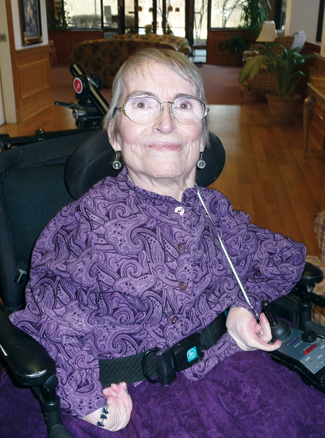 Jackie Page’s mission throughout her professional and personal life has been about two things: access and attitude. Born with quadriplegia during the depression in Asheville, N. C., Page had to adapt to life with few resources besides her own self determination.
Jackie Page’s mission throughout her professional and personal life has been about two things: access and attitude. Born with quadriplegia during the depression in Asheville, N. C., Page had to adapt to life with few resources besides her own self determination.
She came a long way, to receiving a bachelor of arts in sociology, a master of arts in counseling and an educational specialist degree in human development counseling, all from Peabody. Until her undergraduate education, Page was taught at home. During her childhood, that amounted to little more than 90 minutes two days a week. “My mother worked nights as a private duty nurse,” Page recalls. “If she had to sleep, I’d have her put a textbook on my table, and I’d read. The teacher would get so aggravated, and say, ‘Well, I’m not up to there yet.’ But there was no TV; I didn’t have anything else to do except read.”
Page became the first Peabody student in a wheelchair to earn a degree. In later years she broke through other barriers as a disability advocate, both in her work with Outlook Nashville and Easter Seals in Asheville. She is best known for her nearly three decades as director of the Nashville Metro Government Disability Information Office. In that role, Page was a regular fixture on panels and at conferences, spreading public awareness about the needs and rights of those with disabilities.
“It was a dream come true to be able to introduce clubs, organizations and classrooms to someone who could describe the world as seen by a person with a disability,” Page says.
Retired in 2005, Page recently has encountered significant health challenges. Rising medical costs and a dwindling retirement income forced Page to sell her home and give up her independence. She currently resides in an assisted living center in Nashville, dealing firsthand with the consequences of a state that has virtually no home- or community-based services or funding for people with physical disabilities.
If [society has] the appropriate attitude, then [it] will have already done a lot of these things, and not need magpies like me.
—Jackie Page
Which brings the story back to access and attitude. “If [society has] the appropriate attitude, then [it] will have already done a lot of these things, and not need magpies like me saying, ‘When are you going to put this in place?’ ” Page said.
“You can’t have access without attitude. And it’s difficult for people to learn what a person with a disability expects from others, unless there’s access. So it’s all intertwined.”